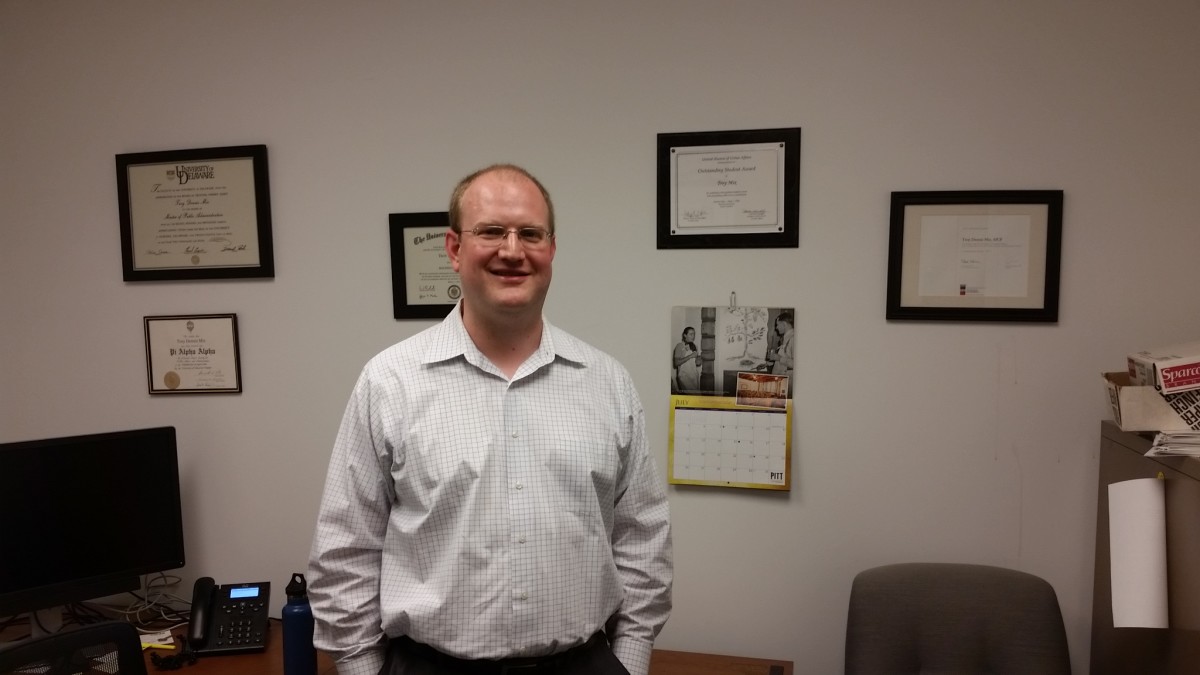Troy Mix was born and raised in small towns strung along the Rust Belt — mill towns and farming communities deeply impacted by industrial disinvestment in the 1980s. They were “places of decline” throughout upstate New York and Central Pennsylvania.
He remembers his hometown paper mill moving to Mexico when he was in 6th grade. He remembers the paper mill employees who were displaced.
“My father was on borough council and would come back with stories,” Mix recalled. “It was always being discussed on some level, and I was witnessing it in my community.”
I have a soft spot for the Rust Belt. We're a little far south, but we have a lot of the same issues in Delaware.
Growing up in the Rust Belt planted a deep-seated passion for economics within Mix. It was a passion that was only fostered further when he attended the University of Pittsburgh as an undergrad.
“They had been affected by downturn in the steel industry, but there were still vestiges there and they were just on the uptick,” Mix said of Pittsburgh at the time. “I was really exposed to urban planning and what regional economists call ‘economic restructuring’ — going from this manufacturing economy to more of a service and research-based economy.”
When Mix went to the University of Delaware to pursue his master’s in public administration (he wanted to be a city manager), he began working on comprehensive economic development plans for several small towns in the state. He was working on zoning codes — what he calls the “nuts and bolts” of local government — in towns like Odessa, Middletown and Viola.
After graduating with his master’s in 2004, UD brought Mix on as a policy scientist. At the time, Mix said Delaware was the only state that didn’t have a Comprehensive Economic Development Strategy (not having one in place bars a region from receiving assistance from the Economic Development Administration). In his first year employed as a policy scientist, Mix authored the Delaware’s first CEDS.
Mix’s love for small town economic development was bolstered when he began doing work in Georgetown. Something felt familiar. Mix was noticing parallels.
“I have a soft spot for the Rust Belt,” he said. “We’re a little far south, but we have a lot of the same issues in Delaware.”
In January 2010, Mix left UD to pursue his Ph.D. in regional planning from the University of Illinois, where his focus is on university involvement in economic development.
What is a university’s role in economic development?
“The successful [universities] play a different role than commonly conceived,” Mix said. “They’re not just a factory of patents. That can be part of it, but it’s also that the university is laying out a vision for the region and helping to convene those discussions.”
Mix believes the University of Delaware already has a lot of that involvement in place. But lower Delaware — that’s a place where Mix said attention needs to be paid. That’s why he heads up the Sussex County Broadband Forum, focused on bringing the community together to advocate for better broadband in the county (check out Mix’s report on the State of Broadband in Southern Delaware).
“That’s a place where units like the university I work for can play a bigger role in helping to keep the discussion going,” Mix said. “There’s just not as much natural infrastructure there.”
Before you go...
Please consider supporting Technical.ly to keep our independent journalism strong. Unlike most business-focused media outlets, we don’t have a paywall. Instead, we count on your personal and organizational support.
Join our growing Slack community
Join 5,000 tech professionals and entrepreneurs in our community Slack today!

The person charged in the UnitedHealthcare CEO shooting had a ton of tech connections

From rejection to innovation: How I built a tool to beat AI hiring algorithms at their own game

Where are the country’s most vibrant tech and startup communities?

